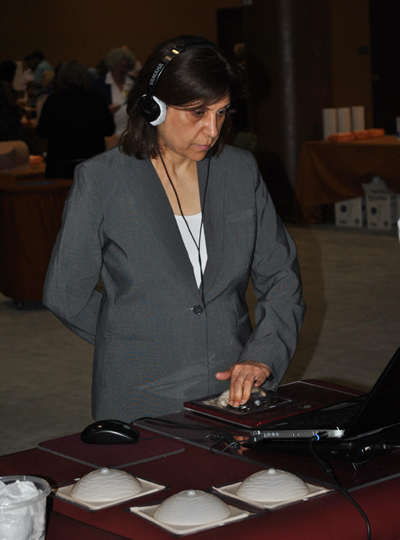VHA SimLEARN
Simulation training key to meeting the health needs of women Veterans

By Women Veterans Health Strategic Health Care Group
WASHINGTON, DC – Women’s Health is meeting its goal of training thousands of VHA providers in women’s health care topics partly by using state-of-the-art simulation equipment. Women’s Health, in partnership with SimLEARN, purchased MammaCare® Clinical Breast Exam Simulators for each of the 21 Veteran Integrated Service Networks (VISNs). Recently, 200 VA staff completed training that will allow them to teach enhanced breast exam techniques using the simulators to other staff members in their VISNs. The simulator is a tactually accurate breast model placed on a pressure-sensitive tablet. It comes with different breast inserts containing various lesions to teach providers the difference between the feel of normal, nodular breast tissue and the feel of small lesions. The simulator gives trainees feedback on proper palpation methods and how to examine the breast in a thorough, systematic manner. Location and pressure are recorded on a portable computer and results are stored for statistical analysis.
“Performing a breast examination is a complex skill,” said Laure Veet, M.D., Director of the Women’s Health Education office. “It’s something that must be taught and practiced. The simulators are designed to allow providers to perfect their techniques and become more comfortable and confident about performing the exams.”
One-day to one-and-a-half day, face-to-face training was conducted at 18 VISNs. In addition, two VISNs held one day video teleconference training. Most of the sessions were attended primarily by physicians, nurses and nurse educators. More than 90 percent of participants said the training improved their confidence and performance in breast examinations.
Clinical breast exams are considered an important method in identifying abnormal breast tissue for further testing. A 2010 study by the Mayo Clinic Department of Surgery and Mayo Foundation found that out of 592 cases of breast cancer, 43 percent presented as palpable masses that were discovered during clinical breast exams.
“Clinical breast exams are a critical component of comprehensive women’s health care. By learning to do it more proficiently, we’re improving care for our women Veterans,” said Dr. Veet.
Women’s Health offers a range of educational and training opportunities in women’s health topics. The offerings include hands-on instruction, as well as online and audio courses designed for physicians, physician assistants, nurse practitioners, staff nurses, pharmacists, social workers and psychologists.
For more information about other women’s health training opportunities, email the Women’s Health Education Team: VHAWHET@va.gov or visit vaww.infoshare.va.gov/sites/womenshealth/education/default.aspx.
(Photo top right) Samina Iqbal, M.D., Director of Women’s Health at the Palo Alto VA Medical Center and a Senior Consultant for Women’s Health, practices with one of the simulators during a women’s mini-residency in Orlando, FL. (VA courtesy photo)



















